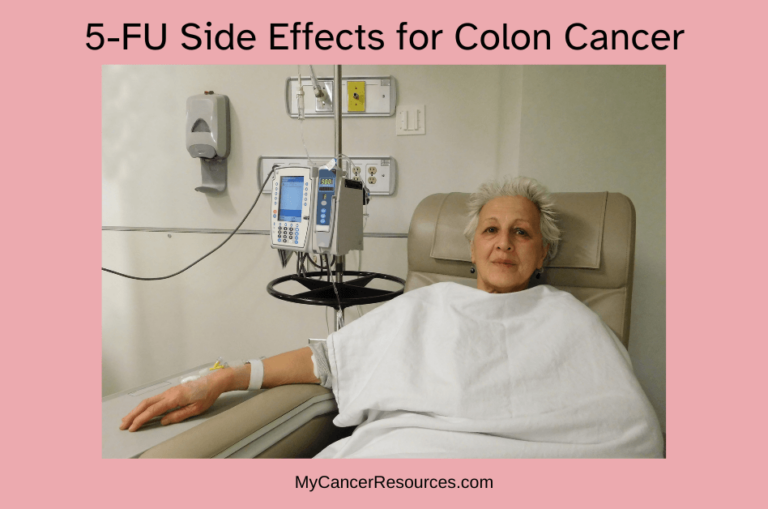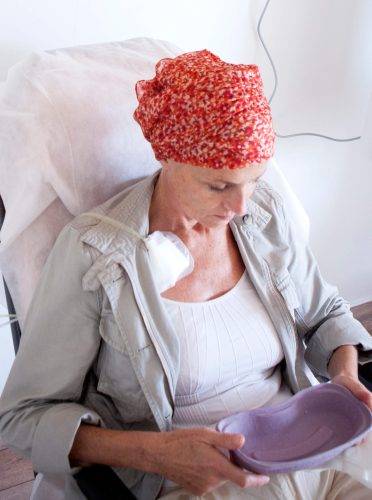
If you or someone you’re caring for has colon cancer, one of the types of chemotherapy treatment that may have been recommended is fluorouracil, or 5-fu. It’s common to wonder what the 5-fu side effects for colon cancer are, so that’s what I’ll be diving into today.
Understanding 5-FU and Its Role in Colon Cancer Treatment
Colon cancer can be treated in a number of ways, depending on its stage and grade, meaning, how big the tumor is, and where, if anywhere, it has spread in the body.
Surgery is often the first line of treatment. Surgery is typically followed by chemo drugs to make sure all of the cancer cells are gone.
Fluorouracil, also called 5-FU, is the main chemotherapy drug used for advanced (stage III) or metastatic colorectal cancer (stage IV), or if there is a high risk of the cancer returning.
5fu is a type of chemo drug that is called an antimetabolite. These are similar to molecules that naturally occur in the body, except for some slight differences.
It’s these differences that let the drugs stop the growth and spread of cancer cells. The way 5-fu works is that it binds to a cell and blocks it from copying its DNA.
Since a cell’s DNA has to be copied before it can divide, the cancer cell dies before it can divide and spread.
Sometimes 5-fu is given as a standalone treatment. But most of the time, 5-fu is given as part of a ‘cocktail’ of systemic chemotherapy called FOLFOX that improves its ability to kill off cancer cells. This is a combination of folinic acid (leucovorin), 5-fu, and oxaliplatin.
But for the purposes of this post, I’m just going to focus on 5-fu and its possible side effects.
Possible Side Effects of 5-FU
Every chemo drug has the possibility of side effects. Some are common, and people on those medicines can almost always be expected to experience some of those side effects.
Others are more rare, but can still dramatically impact the quality of life for cancer patients on that drug.
It’s important for you to remember that you may or may not develop any or all of these side effects, so I don’t want to freak you out. This is to educate you, so that you know signs and symptoms to look out for.
If any of these conditions develop, talk to your medical team. They may have suggestions outside of what I recommend below on how to cope with some side effects.
There may even be some medications that can be prescribed to reduce side effects too.
Chemotherapy drugs like 5-FU attack the growth of cancer cells. The problem is, the drugs can’t distinguish between healthy cells and cancer cells in the body.
This means chemotherapy can also damage normal cells. This is what causes most unwanted side effects.
Common 5-fu Side Effects
Mouth Sores – Mouth sores are often one of the first side effects you might notice while on 5fu. These sores in the mouth and down the esophagus can make it hard to eat, drink or even talk.
I have a handy article on how to manage mouth sores – check it out if you’re experiencing this uncomfortable side effect.
Anemia – 5-fu can make your red blood cells drop, leading to anemia. Anemia can make you feel overly tired and weak.
Low White Blood Cell Counts – white blood cells are critical for fighting off infections. When 5-fu causes leukopenia, or low white blood cell counts, your immune system is weakened, which puts patients at higher risk of easily developing a simple cold that could quickly turn into a more serious infection.
Hair Thinning – 5-fu can affect the hair follicles. This causes hair to thin and fall out, but not nearly to the extent that other chemotherapy medications cause. For most people, the hair loss is minimal and the hair grows back soon after treatment ends.
Loss of Appetite – as the chemotherapy treatments affect the lining of the stomach and intestinal tract, patients may lose their appetite. They may not want to eat or drink much.
If this happens, I recommend sucking on ice chips to make sure you’re staying hydrated.
Nausea, Vomiting, and Diarrhea – these are additional side effects that happen as a result of chemo affecting the healthy cells in the digestive tract.
Skin Rash – a red, itchy rash may appear when taking 5-fu. This is often successfully treated with over the counter lotions and creams.
Serious and Rare 5-fu Side Effects for Colon Cancer
Even though the following are less common, some are quite serious side effects and may need immediate medical attention.
(I’ll remind you again that this information isn’t to scare you, but to educate you on what has been reported in other patients. This doesn’t mean that you will experience these rare side effects.)
Allergic Reactions – while receiving a 5-fu infusion, staff will observe patients for signs of an allergic reaction, which can show up in different ways. Signs of allergy include shortness of breath, chest pain, and swelling of the face.
Hand-foot Syndrome – this can start out as redness in the hands and/or feet. It can progress to sensitive skin and pain. Sometimes the skin can blister and peel.
It’s important to let your medical team know at the first signs of hand-foot syndrome, because it can quickly move into a very painful condition.
Neuropathy – nerve damage can occur as a result of taking 5fu. Symptoms include numbness and tingling in the hands and feet, and can eventually develop into pain in the feet and hands.
This is rare when just taking fluorouracil, but is much more common if receiving the FOLFOX combination of chemotherapy treatment.
If neuropathy develops, your medical team may reduce the dose of medication, or delay the next chemotherapy cycle to see if the symptoms clear up.
Encephalopathy – this is very rare, but can be alarming. This toxicity develops and leads to high levels of ammonia in the system, and creates mental confusion, strange behavior, and even seizures.
Heart Conditions – this is another less common, but serious side effect that can happen as a result of 5-fu chemotherapy. Increased blood pressure, heart attacks, chest pain, an enlarged heart and congestive heart failure have all been reported.
Managing Side Effects
Here are suggestions for managing 5-fu side effects:
- Stay in close communication with your healthcare team: Regularly discussing your symptoms helps them decide if the treatment plan needs to be adjusted, postponed or discontinued, depending on how severe the side effects are.
- Adopt a gentle diet: Eating easy-to-digest foods can ease stomach discomfort. Cold food can be soothing, but remember to steer clear of foods that are too acidic or spicy, as they can upset your stomach.
- Premade nutritional shakes often contain iron (check the labels) – this can help boost your red blood cells and help overcome anemia, while also providing adequate nutrition if you don’t have much of an appetite.
- Stay hydrated: Drinking plenty of fluids helps counter some of the dehydration effects of treatment, such as dry mouth and skin.
- Embrace rest: Your body is fighting a tough battle; give it the extra rest it needs so your recovery can go as smoothly as possible.
- Monitor your blood pressure closely: 5-FU can impact blood pressure, so it’s important to keep a close eye on this.
- Avoid people who are sick, especially if your number of white blood cells is low, since you’ll have a harder time fighting off infections.
- Follow the tips recommended in this post about soothing mouth sores.
Questions to Ask Your Healthcare Provider
You’ll likely have a number of questions about the course of treatment with 5-fu, side effects and effectiveness of the treatment. Here are some additional questions you may want to ask to have a clearer understanding of the treatment process and what to expect.
- Could you detail how my treatment plan, including chemotherapy regimens and possible adjunct therapies like radiation therapy, is tailored to manage my specific type of cancer?
- What proactive steps can I take to prevent some side effects, such as hand-foot syndrome or mouth sores?
- With my medical history, am I at higher risk for certain side effects like heart attack or congestive heart failure?
- Are there any dietary or lifestyle modifications I should consider, including dietary supplements to best support my body during treatment?
- What should I or my caregiver do if I experience severe side effects or an allergic reaction to the medication?
- Could any part of my treatment require hospitalization, for example, if I develop blood clots?
- How will the healthcare team, including oncologists, nurses, social workers and dieticians support me throughout my treatment?
- What additional resources are available for me to learn more about this chemo drug and what to expect during treatment?
Remember, knowledge is power.
Arming yourself with information is a powerful step toward taking control of your treatment journey.
Asking questions is important if it means you better understand what is going on. This can help you be an active participant in making important decisions about your cancer treatment.
Remember, your healthcare team is there to guide and support you every step of the way, so don’t hesitate to reach out to them with any concerns or questions you may have.
The Future of 5-FU: Research and Developments
Scientists continue to conduct research on different formulations of 5-fu.
The goal is to have an effective type of chemotherapy option that has fewer side effects and/or less severe side effects, but is still effective at attacking cancer cells.
Other laboratory research and clinical trials are exploring genetic testing for enzyme deficiencies. For those with dihydropyrimidine dehydrogenase deficiency, they are at a higher risk of experiencing some of the more severe side effects associated with 5-fu.
Knowing if someone has a dpd deficiency can help the medical oncologist tailor treatment to avoid those risks.
Conclusion
All cancer treatments, whether it’s radiation treatment, immunotherapy, chemotherapy, another targeted therapy drug, etc have side effects. Some side effects are worse than others.
You may experience one or two of the common side effects with 5-fu, or you may have a more severe reaction. There is no way to predict how your body will react.
This is why your healthcare provider will keep a close eye on you, and will rely on you and your caregiver to let them know what symptoms you’re experiencing with each round of treatment.
Contact your doctor for any concerning symptoms and never feel like your symptoms aren’t important enough to ‘bother’ your medical team. It’s not a bother at all.
In fact, it’s critical that they are notified as soon as possible, so that action can be taken to try to stop a more concerning side effect that can really be interfering with your quality of life.
Do you have any other questions about 5-fu that you’d like answered? Any other specific chemo drugs you’d like me to dive into and explore what to expect? Share your requests in the comments below.
Medical disclaimer: The content on My Cancer Resources is provided for informational and educational purposes only, and is not intended as medical advice, or as a substitute for the medical advice, diagnosis or treatment by a physician or other health care practitioner.



